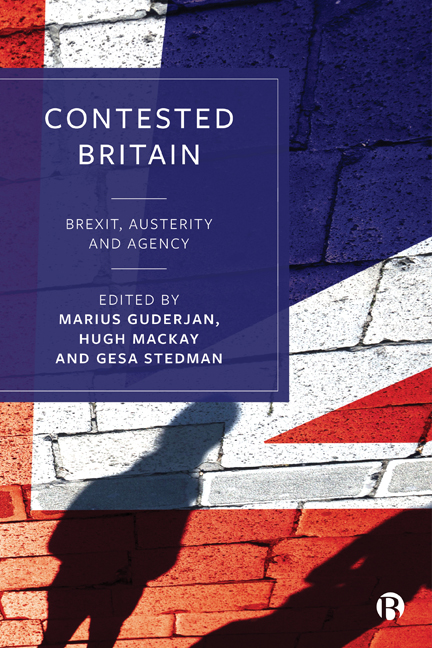7 - Brexit Populism: Disenfranchisement and Agency
Published online by Cambridge University Press: 10 March 2021
Summary
Introduction
Britain in a time of Brexit is a ‘hotbed’ of populist politics. Traditional party-political cleavages and the familiar spectrum of public debate have given way to a cross-party focus on the narrow issues of immigration, border control and sovereignty. Political opinion in England and Wales now shows increasing scepticism towards globalization and multiculturalism and a rise in nationalist and even xenophobic sentiment. Where Eurosceptics long sat on the political side lines, there is now a conscious sharing of Eurosceptic ideas by the main Westminster parties and the brazen use of populist rhetoric.
Though the current disruption of UK politics did not arise out of the blue, what concerns us particularly as political scientists is that Brexit Britain exposes the vulnerability of a multicultural civil society and a nominally liberal-democratic polity to subversion by a small but vociferous populist party. How was it possible for Britain, in particular for England, to slide into populism and for nationalist and xenophobic voices to become mainstream?
Brexit is a highly ambivalent phenomenon, one containing both rational and irrational elements. The rational element lies in its expression of legitimate discontent with social inequality, social exclusion and reduced life chances – for this reason the slogan ‘take back control’ rings true for so many. Indeed, an economic, political and cultural disenfranchisement of citizens dating back decades but exacerbated by recent government austerity policies is a key reason why populist ideas are gaining ground. The irrational element of Brexit lies in the very exploitation of this discontent by populist politicians and media for nationalist and secessionist ends. In these circumstances agency – the basic human need for self-determination – takes distorted forms.
This chapter puts agency at the heart of an understanding of Brexit Britain by showing ways in which the Leave vote is a misguided expression of dissatisfaction with the political, economic and social order. Brexit reveals – in estranged form – a widespread desire of a considerable number of citizens for deeper democratic responsiveness and for a recovery of political, economic and cultural agency.
- Type
- Chapter
- Information
- Contested BritainBrexit, Austerity and Agency, pp. 103 - 116Publisher: Bristol University PressPrint publication year: 2020

